Elisabeth Rosenthal, Mitchell Katz Draw Capacity Audience to Primary Care Summit
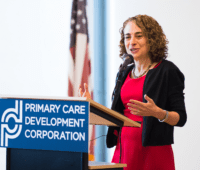

The missing element in effective health care reform? Balance.
The theme echoed throughout the Primary Care Summit, a PCDC event that attracted prominent speakers and a capacity audience of 250 health care professionals last evening.
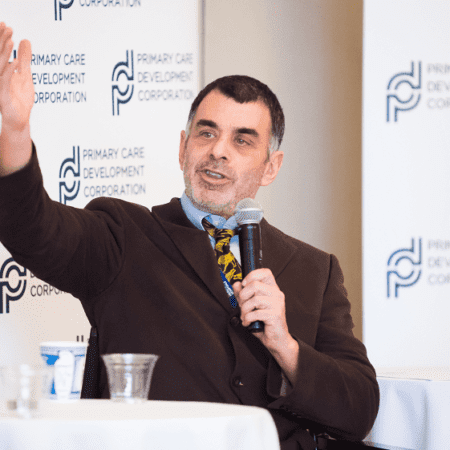 “When you look at European countries that manage to achieve better outcomes than we do, and at lower costs, one of the primary differences is that their systems are two-thirds primary care and one-third specialty care,” said Dr. Mitchell Katz [left], the newly appointed president and CEO of NYC Health + Hospitals.
“When you look at European countries that manage to achieve better outcomes than we do, and at lower costs, one of the primary differences is that their systems are two-thirds primary care and one-third specialty care,” said Dr. Mitchell Katz [left], the newly appointed president and CEO of NYC Health + Hospitals.
“In the United States it’s typically two-thirds specialty and one-third primary. That reflects a lot of why we can’t get the same benefits, despite our spending a lot more.”
Moderated by PCDC CEO Louise Cohen, discussion focused on placing patients — rather than money and politics — at the center of the health care reform debate.
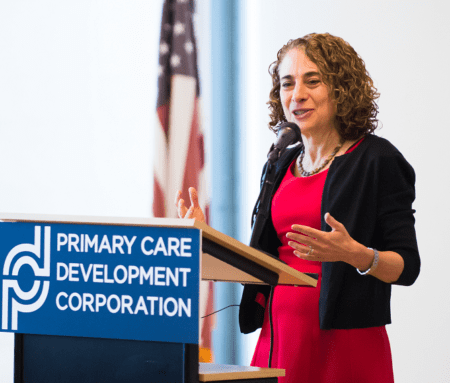 Keynote speaker Dr. Elisabeth Rosenthal [right] highlighted the lopsided focus on profit over patients, a central theme of her book An American Sickness (Penguin 2017).
Keynote speaker Dr. Elisabeth Rosenthal [right] highlighted the lopsided focus on profit over patients, a central theme of her book An American Sickness (Penguin 2017).
“Listening, talking, ‘watchful waiting’: these are key to primary care,” said Rosenthal, editor-in-chief of the nonprofit Kaiser Health News and an award-winning New York Times journalist. “But there’s no money to be made in ‘watchful waiting’ in our system today, and so nobody likes it.
“The financial incentives are so against [this concept] that patients don’t expect it. We have to shift that and give doctors more time to listen to narratives and patients’ stories.”
Rosenthal’s appearance in many ways brought the discussion full-circle: In her 1993 front-page article about New York City’s “doctor deficit,” she highlighted PCDC, which had been founded just a month earlier to address the bleak primary care landscape.
“We’re in a really different and even more critical situation than in the ‘90s,” said Rosenthal, who worked as an ER physician before becoming a full-time journalist. “We’re talking about many of the same issues, but on steroids — because now the crisis of health care affects us all. Politically, I think that’s an opportunity for change. It’s not just poor people and uninsured people; it’s also my colleagues who can’t afford their health care now.”
She relayed the story of a patient in Seattle who, for a one-day hospital visit for an ectopic pregnancy, was billed $45,000. “The only explanation she got on that bill was ‘miscellaneous,” Rosenthal said. “And she was expected to pay. When she asked to see an itemized bill, they said, ‘Pay the co-pay or we’re sending you to collections.’”
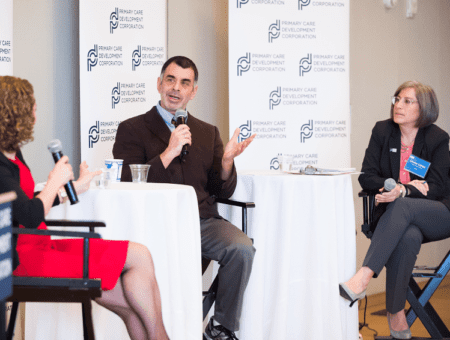 A recent New York Times article on Katz — who as an executive and physician helped transform health care in California — emphasized his commitment to “turning the nation’s largest public health care network into an agency that focuses less on hospital care and more on primary care.”
A recent New York Times article on Katz — who as an executive and physician helped transform health care in California — emphasized his commitment to “turning the nation’s largest public health care network into an agency that focuses less on hospital care and more on primary care.”
“This is right in keeping with PCDC’s vision and H&H’s historic mission,” Cohen said.
Last evening, in addressing the issue of soaring health costs, he drew on his expertise in leading large safety-net hospitals.
“Part of why we need to fight back against the high prices is because it results in people who can either afford getting ridiculous bills or going bankrupt — and for the people who have nothing, it means they don’t get care,” he said.
He cited the comprehensive insight of primary care doctors as critical to bringing down costs overall.
“From housing issues to food, to whether someone is living with a violent spouse, or drug-addicted, or mental-health issues — these are things that primary care doctors are used to thinking about and comfortable thinking about it,” he said. “I think it would make a huge difference in the cost curve” to prioritize primary care.
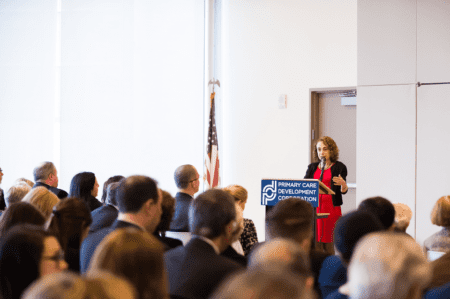 Some power rests with patients, said Rosenthal, whose book offers practical tips on challenging health care-related costs. Still, she said systemic change requires a top-to-bottom reckoning of how we approach care at all levels — from provider to patient.
Some power rests with patients, said Rosenthal, whose book offers practical tips on challenging health care-related costs. Still, she said systemic change requires a top-to-bottom reckoning of how we approach care at all levels — from provider to patient.
“We have to change the culture of what it means to be a patient, and what we expect as the norm,” Rosenthal said. “Because if every rich person is getting a colonoscopy, everyone who doesn’t have resources is going to say, ‘I need a colonoscopy too,’ even though it’s not [always] recommended. We have to change what’s normative in our medical culture, which today usually means, ‘You have to get an MRI.’”
Cohen raised the issue of entrepreneurship, asking whether emphasis on technology helps or hinders efforts to drive down pricing. Both Rosenthal and Katz agreed that whatever the technological advancements, the current system is not sustainable.
“Economists say that you should use price controls in capitalism when the market is not working,” Katz said. “Health care seems to be an example where the market isn’t working. Because no matter how much more technological it gets, it only gets more expensive.”
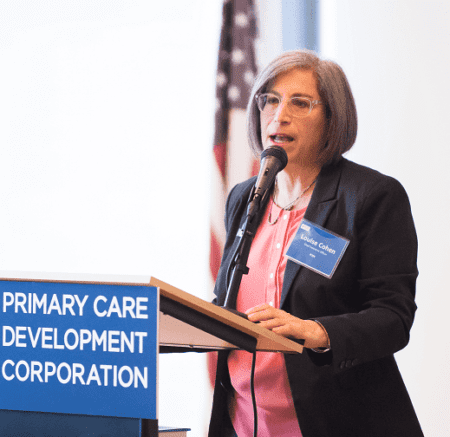 Cohen [left] noted that, of all the shapeshifting in the last 25 years, a constant has been PCDC’s upward momentum. Founder Ronda Kotelchuck‘s original vision for $250 million to finance primary care facilities has tripled since PCDC’s inception, with $875 million directed to urban neighborhoods and rural communities nationwide.
Cohen [left] noted that, of all the shapeshifting in the last 25 years, a constant has been PCDC’s upward momentum. Founder Ronda Kotelchuck‘s original vision for $250 million to finance primary care facilities has tripled since PCDC’s inception, with $875 million directed to urban neighborhoods and rural communities nationwide.
The result has been healthier communities — success that Cohen said offers hope for broader reform.
“We believe that the question of how primary care fits into the health care financial ecosystem is essential for our society to debate and decide,” she said. “We hope that today’s conversation helps illuminate a way forward.”
Register today for PCDC’s 25th Anniversary Spring Gala on Monday, June 4, 2018.
PCDC thanks its Corporate Circle members for their annual support, which helps makes events like the Primary Care Summit possible. The event was also made possible in part by public funds provided through the New York State Department of Health with support from the New York State Legislature.